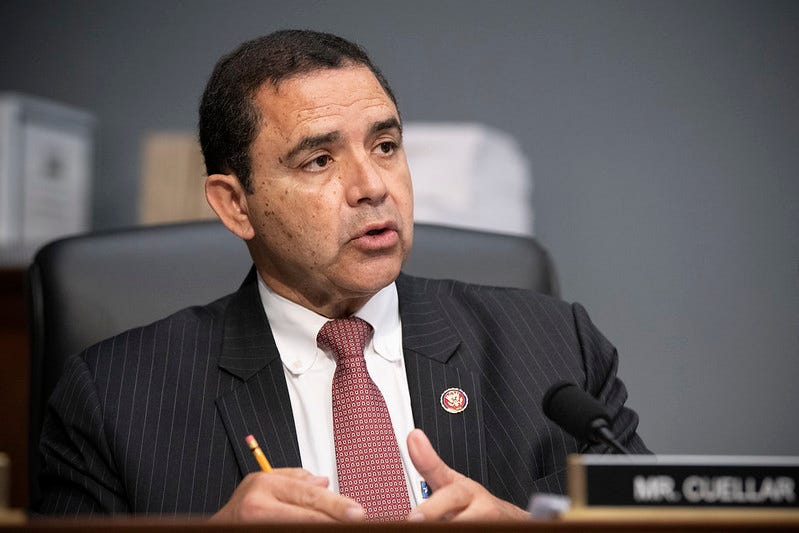Mexican National Guard rescues migrants, but a woman and her two children drown in Piedras Negras
The Border Center for Journalists and Bloggers (BCJB) summarizes the main news on the border for January 15, 2024.
Congressman Henry Cuéllar condemns that Texas police prevented the Border Patrol from passing to the river; three migrants die at the Eagle Pass border

On Friday night, three migrants—a woman and two children, an 8 old girl, and a 10 orl boy —tragically drowned in the Rio Grande near Eagle Pass. The newspaper La Voz de Piedras Negras reported that the deceased were originally from Mexico. Mexican National Guard troops rescued another woman and a minor alive. The two women and three children were part of the same family originally from Mexico City, according to Zocalo, a newspaper in Piedras Negras.
This incident occurred following the Texas National Guard's seizure of a 2½-mile border stretch, a move that has been described as unprecedented. The Justice Department alleges this action hinders Border Patrol agents from performing emergency rescues. According to the Homeland Security Department, Texas officials physically barred agents from reaching the migrants in distress.
The Texas Military Department, however, denies observing any distressed migrants or impeding illegal immigrants during this period. They reported a separate incident on the Mexican side of the river to the Border Patrol. Despite these claims, U.S. Rep. Henry Cuellar points to state responsibility for this tragedy:
Border Patrol personnel were forced out of Shelby Park earlier this week by the Texas National Guard under order of Governor Abbott. In this situation, the Texas Military Department and the Texas National Guard did not grant access to Border Patrol agents to save the migrants.
“This is a tragedy, and the State bears responsibility.” Rep. Cuellar statement.
Mexican sources say that the three migrants recovered today were a family. The female adult was identified as the mother of both children, an 8 year old girl and a 10 year old boy. Rep. Henry Cuellar on X.
To clarify: the Texas Military Department and the Texas National Guard did not grant access to Border Patrol agents to save the migrants. Rep. Cuéllar on X.
The incident has intensified the dispute between state and federal authorities. The Justice Department is appealing to the Supreme Court to intervene, emphasizing that Texas's actions are restricting vital access for emergency migrant aid. Texas counters these accusations, insisting on their support for human life protection and federal law enforcement. Governor Greg Abbott's recent statements at a campaign event further highlight the tension, as he boasts about evicting Border Patrol agents from the area due to dissatisfaction with federal immigration enforcement. (With information from the Houston Chronice, Henry Cuellar’s website, and X.)
Three migrants drowned after state allegedly blocked Border Patrol from reaching them
Three migrants drowned near Eagle Pass park after Border Patrol was denied access
¡Arrastra familia! Mujer y dos menores murieron ahogados en el río Bravo
Chocan EU y Texas por muerte de migrantes
Prolific Drug Trafficker Sentenced to Almost 22 Years in Prison and Ordered to Forfeit $280 million
Washington, D.C.- Raúl Flores Hernández, a 71-year-old Mexican drug trafficker, was sentenced to 21 years and 10 months in federal prison for his role in moving nearly 250,000 pounds of cocaine. Linked to notorious cartels and figures like 'El Chapo' Guzmán, Flores Hernández managed to navigate through complex cartel alliances over three decades. Despite his guilty plea in Washington, D.C., he contested many of the government's claims, leading to a lengthy sentencing hearing.
U.S. District Judge Beryl Howell also ordered Flores to forfeit $280 million in drug proceeds. Prosecutors presented evidence showing his responsibility for a significant portion of cocaine trafficking from South America to Mexico. Flores initially became involved in drug trafficking through connections with the Sinaloa cartel and its leaders.
Despite his extensive criminal activities, Flores maintained a low public profile until his 2017 arrest. His capture drew attention due to the Kingpin Act designation, which implicated notable figures like soccer star Rafael Marquez and singer Julián Álvarez, who faced consequences due to their alleged support of Flores' drug operations.
Flores' defense highlighted his non-violent approach and focus on legitimate businesses. However, prosecutors emphasized his deep involvement with violent cartels and bribery of public officials. With his sentencing in D.C., his San Diego indictments are expected to be dismissed. Flores' case underscores the intricate and extensive networks of drug trafficking and the challenges in prosecuting high-level traffickers. (With information from the San Diego Union Tribune and the Department of Justice.)




